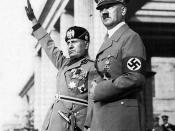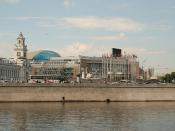In 1914, the First World War was broken out in Europe. Until Germany was surrendered in November 1918, the First World War came to an end. The First World War was in such a large scale and it affected the world greatly. Politically, four European empires were collapsed, new states were risen, the democratic countries were weaken and the League of Nations were formed. Socially, the state of women was risen up and religious faith was declined. And economically, there were heavy casualties and severe destruction.
For the political effects, the four European empires: Hohenzollern, Hapsburg, Romanov and the Ottoman Empire were collapsed. Germany lost all of her colonies, Alsace-Lorraine was returned to France. Totally, Germany lost a hundred percent of colonies and thirteen percent of territory and became a republic; Austria-Hungary was divided into two separate countries; Russia became the world's first Communist state and Turkey turned into a republic.
Also, new states were formed which were politically and economically weak, such as Estonia, Yugoslavia, Latvia and Poland. Their existence encouraged aggression from stronger countries in the future.
Apart from the four empires, democratic countries in Europe were also weaken down. Britain, France and Italy were exhausted and began to decline as world powers. The USA became the richest nation instead.
Moreover, the League of Nations was set up in Geneva in 1920. It was to help settle international disputes in the future as the world had suffered such a great scale of war.
For the social effects, the state of women was risen up and class distinction was reduced because of the WWI. As most of the men were fighting in the war at that time, the women had to take up the men's jobs. They played an active role in supporting the country during absents of men.



Short
This essay was short. There is not much detail.
3 out of 3 people found this comment useful.